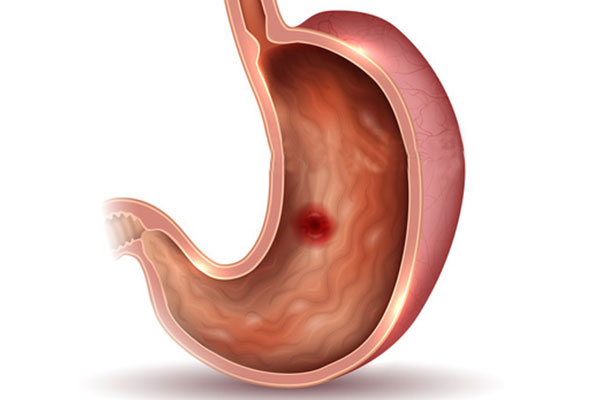Stomach ulcer

What is stomach ulcer?
Stomach ulcers are open sores that develop on the lining of the stomach. The ulcer in the stomach is also called a gastric ulcer, while those occur in the part of intestine are known as duodenal ulcers. Both types of ulcers are referred to as peptic ulcers.
Signs and symptoms
Patients usually describe the stomach ulcer as a burning and cramping feeling in the abdomen that comes in waves. Typically, the pain becomes even worse before meals and at bedtime when the stomach is empty. However, not all ulcers are painful. Patients can also experience bloating, nausea, loss of appetite, and heartburn.
What causes stomach ulcer?
The mucus layer covering the stomach lining can prevent the acid from damaging the lining of the stomach. When the mucus layer is reduced by some factor, the digestive juice can lead to a break in the stomach. This is usually caused by:
Helicobacter pylori (H. pylori) infection
Around 4.4 billion people are estimated to be infected by H. pylori worldwide while many regions in Asia including Hong Kong show an infection rate over 55%. If left untreated, the carriage of H. pylori will significantly increase the risk of developing chronic gastritis, gastric or duodenal ulcer. The infection is associated with as many as 90% of duodenal ulcers and 70-75% of gastric ulcers.
Side effect of certain drugs
Long-term use of nonsteroidal anti-inflammatory drugs (NSAIDs), such as aspirin, ibuprofen, or naproxen can increase the risk of getting peptic ulcer disease by four times when compared to non-users.
Dietary factors
The consumption of spicy food were hypothesized to cause ulcers, but has been shown to be of relatively minor importance. To minimize symptoms, individuals with ulcer disease should avoid or limit coffee, strong tea and alcohol. Furthermore, irregular eating habit can adversely affect the digestive health. When people feel hungry, the stomach is stimulated to produce even greater amounts of digestive acid which may attack the lining of the stomach.
Complications
Complications of stomach ulcers are relatively uncommon including internal bleeding, perforation and gastric outlet obstruction. Patients may experience vomiting of red-coloured blood and dirty brown vomit, passing stools that are black, severe abdominal pain over a prolonged period and fever if the complications do occur. Patients should seek medical attention immediately.
Diagnosis
Doctor will recommend a gastroscopy for patients in whom a peptic ulcer is suspected. Gastroscopy involves a flexible endoscope which passes through the mouth of patients to the oesophagus, stomach and duodenum to examine if there is any inflammation or tumour diseases. By direct visual identification, the location and severity of an ulcer can also be described. Biopsy and polypectomy will be performed during examination when necessary.
Treatment
Treatment of stomach ulcers depends on the severity and cause of the conditions. In many cases, patients will be prescribed a medication called a proton pump inhibitor (PPI) to reduce the amount of digestive juice and allow the ulcer to heal.
In particular cases, if an H. pylori infection is responsible for the ulcers, the doctor will prescribe triple therapy which consists of an acid suppressor and two to three antibiotics. If the ulcers are caused by the use of NSAIDs, the doctor will discuss with the patient whether he/she should keep using NSAIDs.
Prevention
Citizens can reduce the risk of developing peptic ulcer by the following ways: stop taking non-prescribed drugs, especially NSAID, aspirin and steroid; quit smoking; and reduce or avoid alcohol intake.
On the other hand, citizens should have regular meals, stop overeating or consuming too much spicy foods to protect the gastric mucosa.
*The above information is for reference only, please consult your doctor for detail.

 3405 8288
3405 8288
